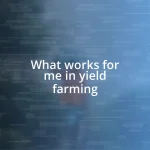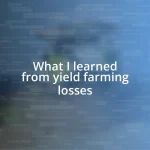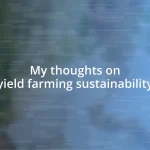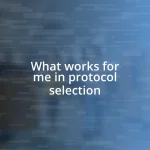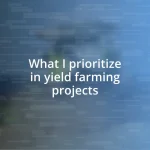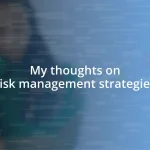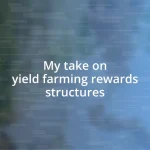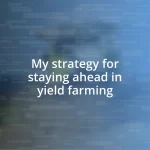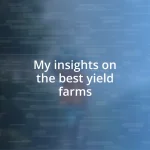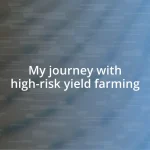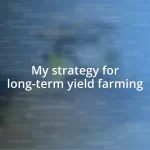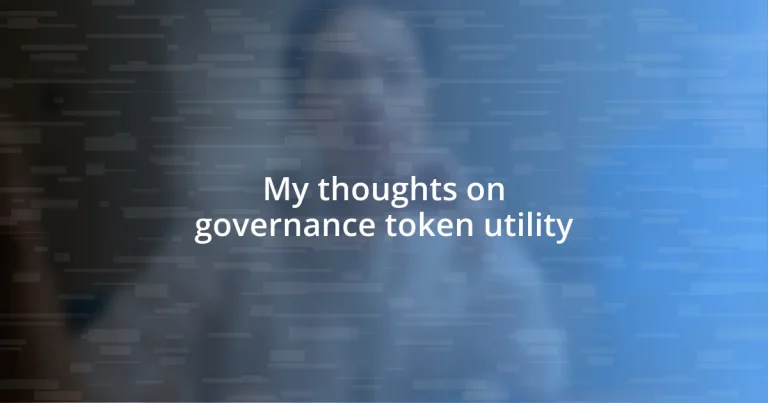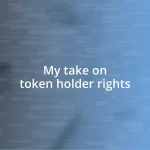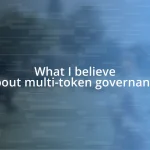Key takeaways:
- Governance tokens empower holders to actively participate in decision-making, fostering community engagement and ownership.
- Effective governance token models should simplify involvement to prevent low voter turnout and encourage genuine community participation.
- Future trends indicate a shift towards Layer 2 solutions, hybrid models for rewards, and cross-platform governance to enhance the ecosystem.
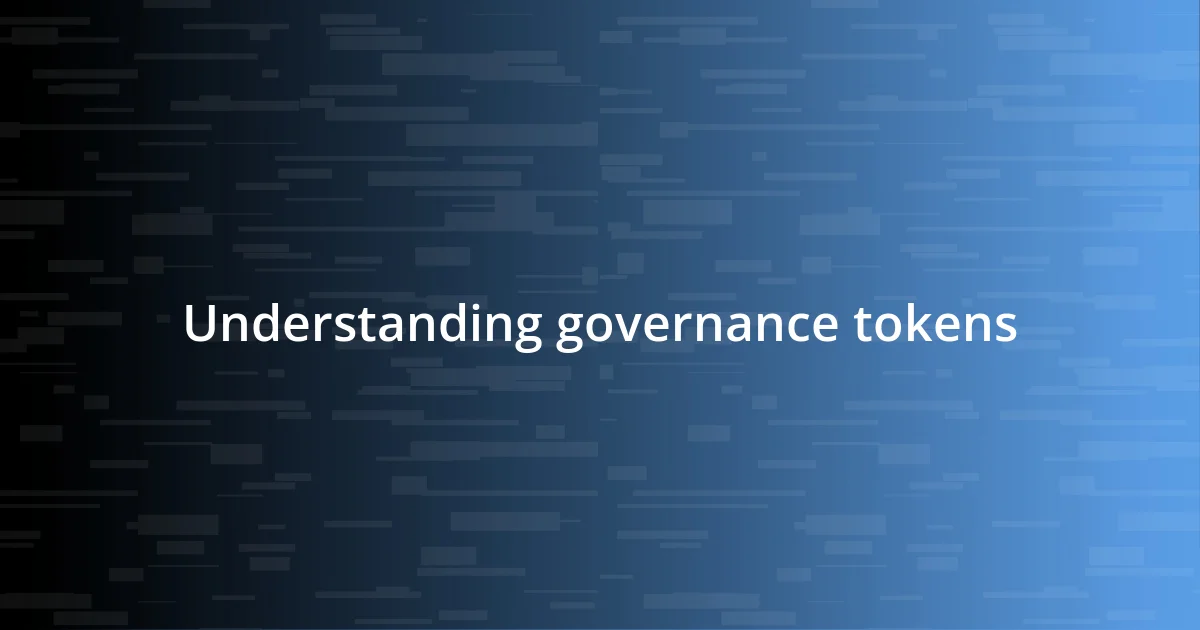
Understanding governance tokens
Governance tokens are digital assets that empower holders to participate actively in the decision-making processes of a decentralized network. I remember the first time I wrapped my head around the concept—it felt like a light bulb moment! The idea that I could have a say in the future of a project I believed in was exhilarating.
These tokens allow individuals to vote on essential matters, such as protocol upgrades and fund allocation. Have you ever been part of a community where everyone’s voice counts? It’s a powerful experience! Governance tokens create a sense of ownership, turning passive supporters into active participants, which can lead to a stronger, more resilient ecosystem.
From my observations, projects embracing governance tokens often foster greater trust and loyalty among their communities. It’s fascinating how these tokens can create bonds between participants who share a vision, reinforcing a collective commitment to the project’s success. Isn’t it remarkable how a simple token can shift the dynamics of engagement and collaboration?
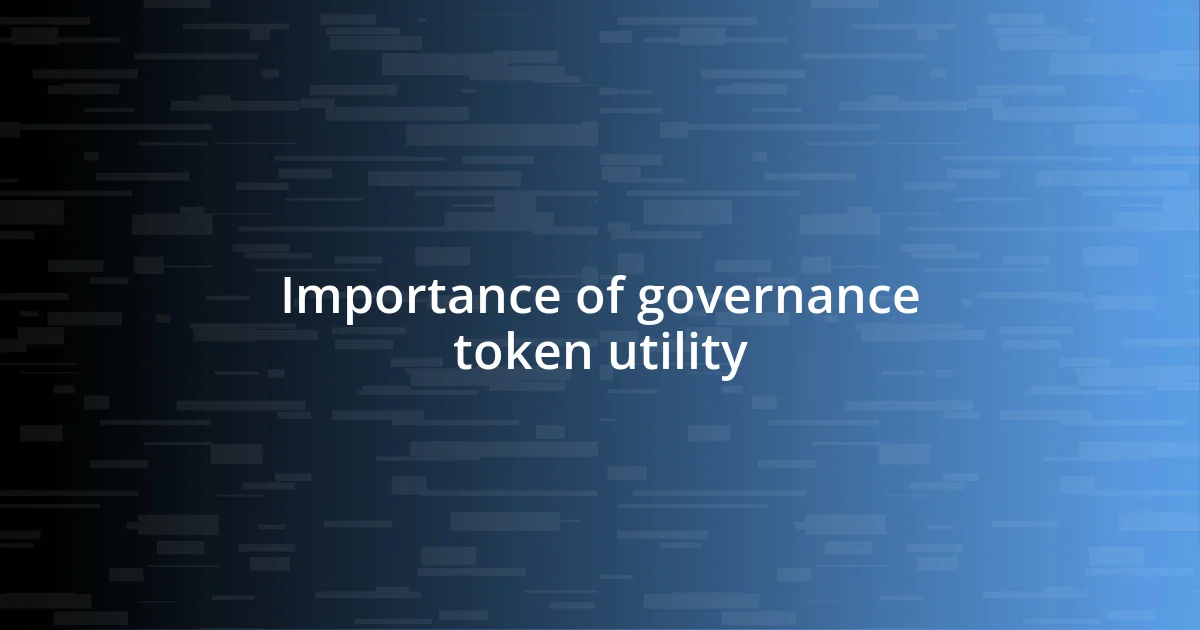
Importance of governance token utility
Governance token utility is pivotal because it directly enhances the efficacy of decentralized decision-making. When I think about the impact of these tokens, I’m reminded of my own experiences participating in voting processes. It’s not just about expressing an opinion; it’s a chance to shape the future direction of a project I care about, which adds a layer of responsibility and excitement. Communities flourish when everyone has a say, and governance tokens make that possible.
Moreover, they serve as a bridge between developers and users, fostering communication and trust. In one project I followed, token holders regularly discussed ideas on forums, creating a vibrant ecosystem where creativity thrived. It was inspiring to witness diverse opinions coming together, resulting in innovative solutions. This active involvement encourages a sense of belonging that’s often missing in more conventional systems.
Finally, governance tokens drive accountability among project leaders. My perspective is that when token holders can voice their preferences, it places pressure on those in charge to act transparently. In my experience, this often leads to higher standards of governance as leaders know they are being watched and can be held accountable. I’ve seen how this dynamic transforms not just a project’s trajectory, but the very culture within the community.
| Aspect | Importance of Governance Token Utility |
|---|---|
| Empowerment | Allows holders to influence decisions actively |
| Community Engagement | Fosters a sense of belonging and collaborative spirit |
| Accountability | Encourages transparency and responsibility among leaders |
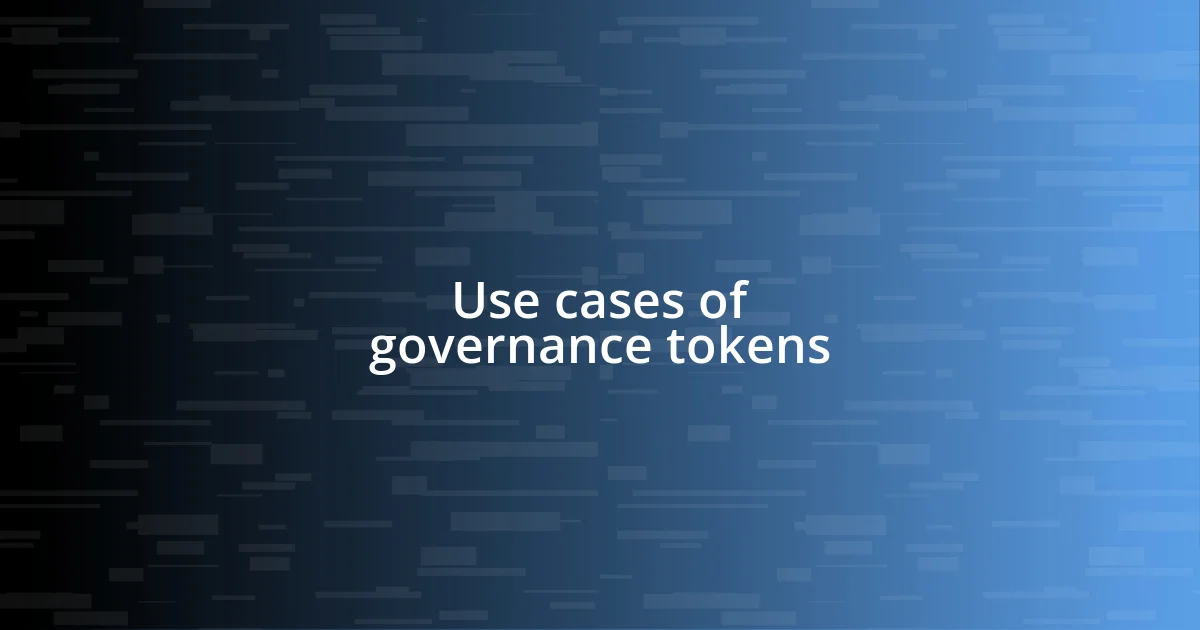
Use cases of governance tokens
The use cases of governance tokens are numerous and impactful, extending far beyond just voting rights. I’ve seen firsthand how these tokens can enable holders to initiate proposals, shaping the project’s direction. Just the other day, I participated in a forum discussion where someone suggested a new feature for the platform, and it struck me how quickly community feedback turned that idea into a tangible roadmap. This ability to contribute directly to development truly fosters a sense of shared ownership among members.
- Voting on protocol changes
- Proposing new project features
- Allocating funds for community initiatives
- Creating community-driven governance structures
In my experience, governance tokens also allow for collaborative dispute resolution. I vividly recall a situation in one project where a disagreement arose over resource allocation. Instead of escalating issues, token holders participated in a democratic vote to come to a solution that represented the majority opinion. This not only resolved the conflict swiftly but also bolstered trust within the community. When I think back on that experience, it reinforces just how vital governance tokens are for facilitating a constructive dialogue among participants.
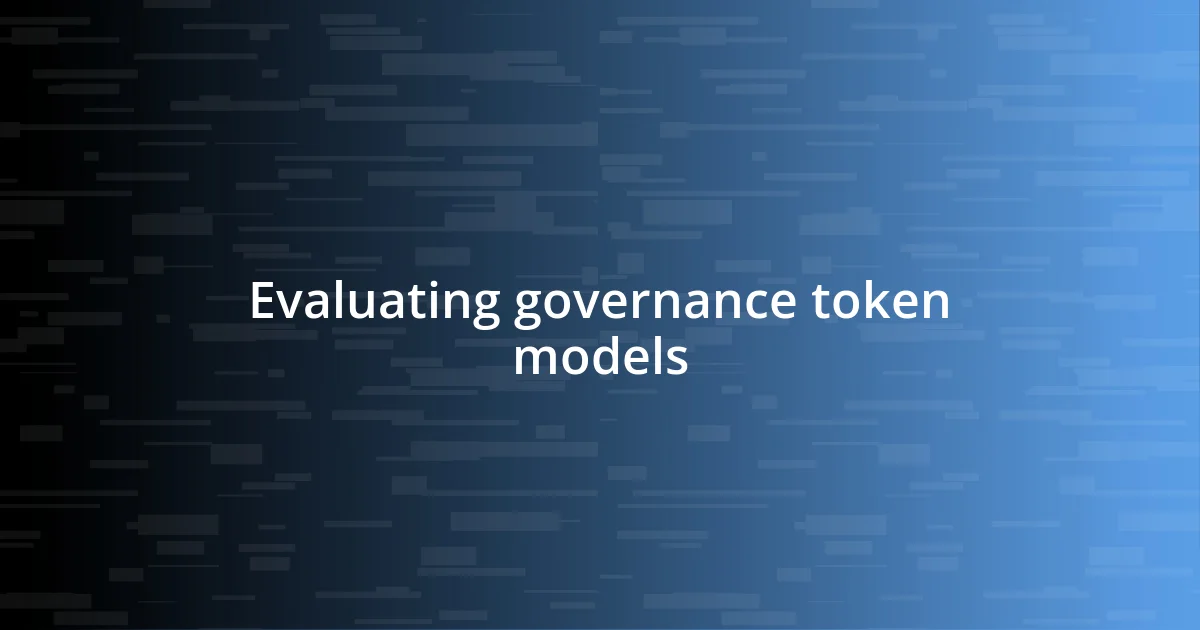
Evaluating governance token models
When evaluating governance token models, it’s essential to consider how they encourage active participation among community members. I recall joining a governance call where the exchange of ideas felt electric; everyone was eager to advocate for their proposals. It made me realize that the model’s structure plays a crucial role in determining whether token holders will engage or remain passive observers. If the process is too cumbersome or opaque, I can see token holders losing interest quickly.
Additionally, I’ve often thought about the balance between decentralization and practicality. In one instance, a project I was involved with had too many voting options, which led to confusion rather than clarity. This experience taught me that an effective governance model should streamline decision-making. When users can vote on straightforward, impactful proposals, it not only enhances engagement but also fosters a sense of purpose. Isn’t it fascinating how a well-structured voting process can spark a remarkable level of community collaboration?
I believe analyzing the outcomes of governance token implementation is also vital. In a recent project, I watched as specific proposals led to genuine improvements in the platform, driven entirely by community feedback. It really struck me how these tokens serve as a linchpin for innovation within a decentralized ecosystem. When results reflect the community’s collective will, it reaffirms the power and potential of governance tokens in shaping the future of the project, wouldn’t you agree?
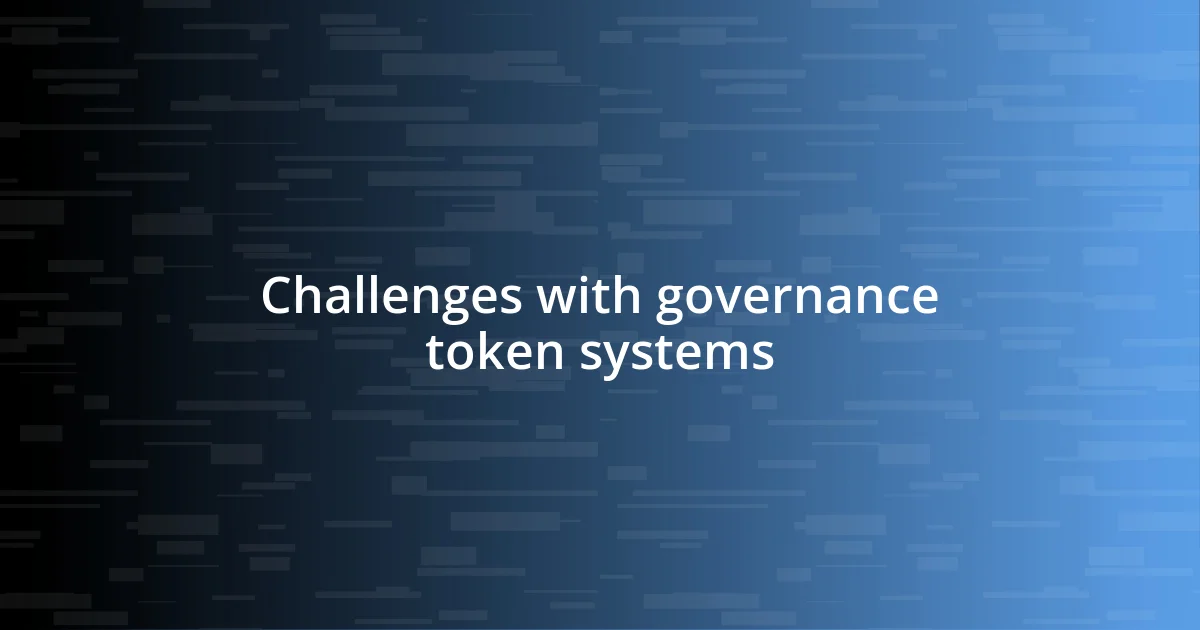
Challenges with governance token systems
One significant challenge with governance token systems is the potential for low voter turnout. I’ve witnessed projects where only a small fraction of token holders participate in crucial votes. Reflecting on such situations makes me wonder: do these holders feel their voices matter? In many cases, if people aren’t engaged, decisions can easily swing in favor of a vocal minority, which can ultimately undermine the core philosophy of decentralized governance.
Another issue I’ve come across is the complexity of governance mechanisms. In one project, I encountered a system that was so intricate that many community members felt overwhelmed. I still remember a particularly frustrating voting round where clear instructions were desperately needed, yet they were muddled in jargon. It begs the question—why complicate something that’s meant to empower the community? Simplifying these processes could enhance participation and ensure diverse viewpoints are represented.
Lastly, I’ve seen governance tokens occasionally used as tools for speculation rather than genuine engagement. There was a time when I noticed that some investors were buying up tokens purely to influence voting outcomes without any real interest in the project itself. That raises a crucial point: how can we ensure that those making decisions are truly invested in the community? It’s a challenge that requires us to rethink the incentives behind token distribution, as only then can we hope to cultivate a responsible and engaged governance structure.
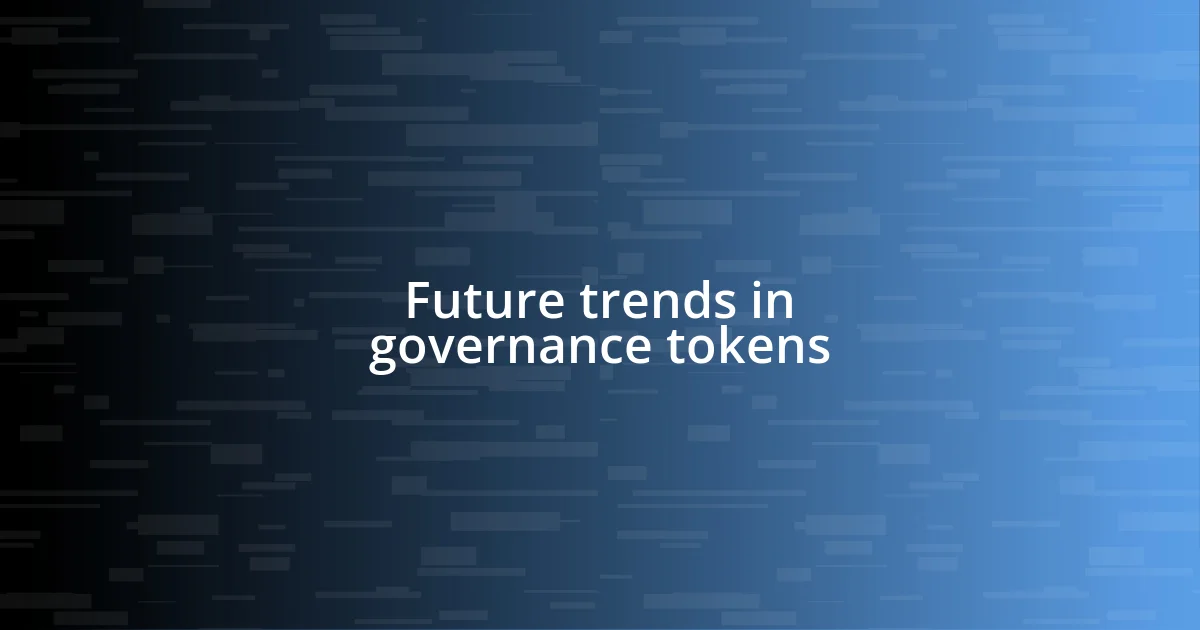
Future trends in governance tokens
As I look towards the future of governance tokens, I envision an increased focus on integrating Layer 2 solutions to enhance scalability and reduce transaction costs. I remember a project I was involved in that faced overwhelming congestion during voting periods, which really dampened the enthusiasm of participants. Imagine a world where tokens facilitate seamless governance participation without the worry of skyrocketing fees—wouldn’t that fundamentally change the landscape?
I also think we’ll see a rise in hybrid models combining governance tokens with other incentive structures. In one recent discussion, a colleague proposed using a reward system for active voters, which sparked my curiosity about how we can encourage ongoing engagement. Picture a system where accountable participants are recognized for their efforts—could this not create a more vibrant community atmosphere and ultimately lead to better decision-making?
Moreover, I find the potential for cross-platform governance fascinating. If we could bridge governance tokens across different decentralized applications, it would allow for a unified voice in multiple ecosystems. I can still recall the excitement during a cross-platform proposal where token holders from various projects came together. Wouldn’t it be incredible if governance could transcend individual projects, fostering a broader sense of collaboration and shared vision across the entire blockchain space?
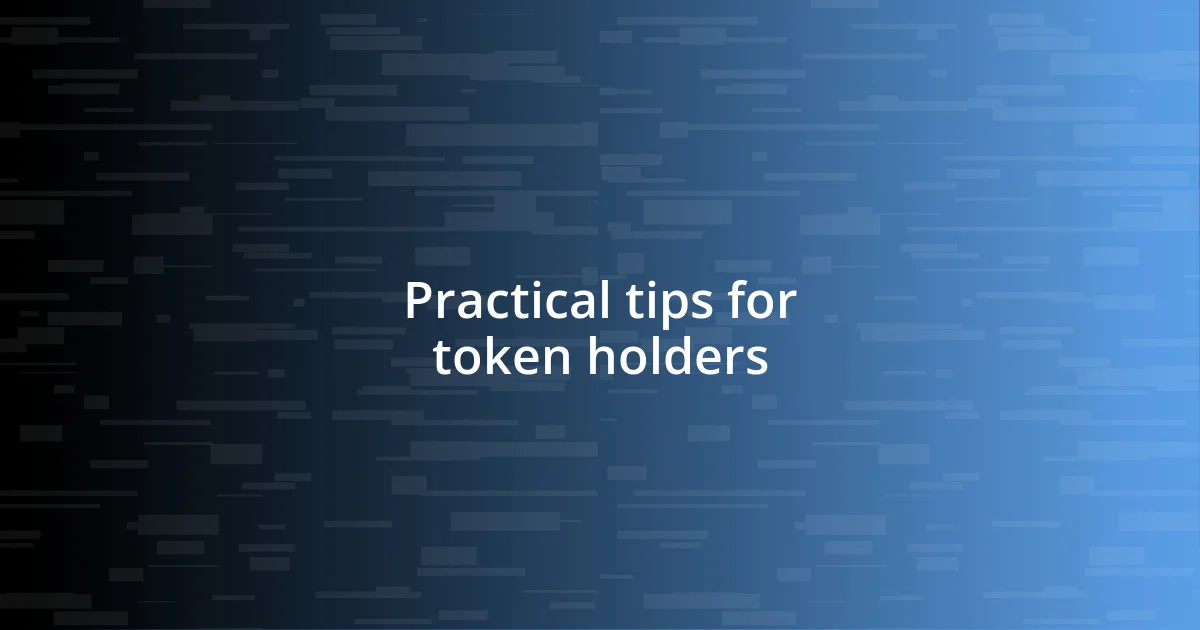
Practical tips for token holders
When holding governance tokens, it’s essential to stay informed about upcoming proposals and discussions. I remember the anticipation I felt leading up to a vote that would impact my community’s project direction. Engaging actively in these dialogues not only empowers you as a token holder but also ensures your voice is heard. After all, wouldn’t you want to influence decisions that affect your investment directly?
Additionally, consider collaborating with other token holders to form a community group. I once joined a small cohort of passionate holders who shared insights and strategies about participating in governance. This collaboration opened my eyes to different perspectives and ultimately boosted our voting turnout. Isn’t it easier and more enjoyable to navigate complex governance landscapes when you’re not alone?
Lastly, take advantage of educational resources provided by the project’s team or the wider community. I’ve often seen webinars and forums that break down governance mechanisms in simple terms. When I participated in one, I felt much more equipped to engage. Is it not worth investing some time to deepen your understanding and, in turn, strengthen the governance system you’re part of?
